 (source)
(source)
|
Hans Cloos
(8 Nov 1885 - 26 Sep 1951)
German geologist who was a pioneer in the study of granite tectonics and in model studies of rock deformation.
|
Science Quotes by Hans Cloos (14 quotes)
Anyone who, as a geologist, has been alone and intimate with nature for many years will find himself increasingly often and more clearly placed in a dialogue, in which the other always turns out to be the smarter one.
— Hans Cloos
From Einfükrung in die Geologie: Ein Lehrbuch der Inneren Dynamik (1936), 2. As auto-translated by Google from the original German, “Wer als Geologe lange Jahre mit der Natur allein und intim verkehrt, findet sich immer häufiger und deutlicher in eine Zwiesprache versetzt, bei welcher sich der andere stets als der Gescheitere herausstellt.” Epigraph in R. W. van Bemmelen, 'The Scientific Character of Geology', The Journal of Geology (Jul 1961), 69, No. 4, 453.
By far the most important books for geology students were the quarries and clay pits, the cliffs and
creek beds, the road and railroad cuts in woods and fields. Our words and letters were the imprints of plants and animals in stone, the minerals and crystals, and our vast, inexhaustible, incorruptible, and infallible library was nature itself.
— Hans Cloos
In Hans Cloos, Ernst Cloos (ed.) and Curt Dietz (ed.), Conversation With the Earth (1953, 1959), 28, as translated by E.B. Garside from the original German edition, Gespräch mit der Erde (1947).
For a billion years the patient earth amassed documents and inscribed them with signs and pictures which lay unnoticed and unused. Today, at last, they are waking up, because man has come to rouse them. Stones have begun to speak, because an ear is there to hear them. Layers become history and, released from the enchanted sleep of eternity, life’s motley, never-ending dance rises out of the black depths of the past into the light of the present.
— Hans Cloos
In 'Prologue', Conversation with the Earth (1954), 4. As translated by E.B. Garside from Gespräch mit der Erde (1947).
I never quite lost the feeling that lecturing is a kind of sacrificial slaughter of helpless victims.
— Hans Cloos
In Hans Cloos, Ernst Cloos (ed.) and Curt Dietz (ed.), Conversation With the Earth (1953, 1959), 250, as translated by E.B. Garside from the original German edition, Gespräch mit der Erde (1947).
It was during my enchanted days of travel that the idea came to me, which, through the years, has come into my thoughts again and again and always happily—the idea that geology is the music of the earth.
— Hans Cloos
In 'Prologue', Conversation with the Earth (1954), 3. As translated by E.B. Garside from Gespräch mit der Erde (1947).
My third teacher was by far the wisest and most trustworthy, though he used neither books nor pictures, and was a poor lecturer. He was painfully silent, would talk only after repeated urging, and then often spoke almost unintelligibly in a language which had to be translated to be understood. But what he had to say was final and exhaustive, and could be passed on in good conscience to those who either would not or could not go directly to him for information. This teacher was Nature itself.
— Hans Cloos
In Hans Cloos, Ernst Cloos (ed.) and Curt Dietz (ed.), Conversation With the Earth (1953, 1959), 249-250, as translated by E.B. Garside from the original German edition, Gespräch mit der Erde (1947). [In the original text, “nature itself” was in all lower case. Webmaster has capitalized “Nature” for emphasis, to compensate for the cropped context about the great importance of geology field trips as an instructor.]
Nature could not err, but knew exactly and infallibly. Our function was to ask her questions, to listen patiently to the answers, and to understand them correctly.
And to this end we went out into the field, time and time again. Often at brief intervals we returned to the same outcrop where our Pythia, nature, opened her mouth from time to time to utter her equivocal oracles. Time and again we studied the same stratification, or the same interpenetration of rocks, and yet each time advanced one step further, because of what we had learned on the last visit, because the previous impression had had time to settle, or because this time our eyes were a little keener and now observed what hitherto had escaped them.
And to this end we went out into the field, time and time again. Often at brief intervals we returned to the same outcrop where our Pythia, nature, opened her mouth from time to time to utter her equivocal oracles. Time and again we studied the same stratification, or the same interpenetration of rocks, and yet each time advanced one step further, because of what we had learned on the last visit, because the previous impression had had time to settle, or because this time our eyes were a little keener and now observed what hitherto had escaped them.
— Hans Cloos
In Hans Cloos, Ernst Cloos (ed.) and Curt Dietz (ed.), Conversation With the Earth (1953, 1959), 28, as translated by E.B. Garside from the original German edition, Gespräch mit der Erde (1947).
One day while I was teaching at Marburg a man came to me, whose fine features and penetrating, gray-blue eyes I was unable to forget. He had developed an extraordinary theory in regard to the structure of the earth. He asked me whether I, a geologist, was prepared to help him, a physicist, by contributing pertinent geological facts and concepts. I liked the man very much, even though I was skeptical of his ideas. Thus began a loose co-operation on a subject in which the Red Sea rapidly assumed a central position.
The man was Alfred Wegener.
The man was Alfred Wegener.
— Hans Cloos
In Hans Cloos, Ernst Cloos (ed.) and Curt Dietz (ed.), Conversation With the Earth (1953, 1959), 395-396, as translated by E.B. Garside from the original German edition, Gespräch mit der Erde (1947). For a variant translation of this same passage, see elsewhere on this site’s webpage for Hans Cloos quotations, for the one beginning, “The war found me in Marburg.…”
The earth is large and old enough to teach us modesty.
— Hans Cloos
In 'Prologue', Conversation with the Earth (1954), 8. As translated by E.B. Garside from Gespräch mit der Erde (1947).
The experienced observer does more than merely report and recite. He guides the eager student to an understanding of the earth. He may chart the scientist’s steep, barren road of sober observation and strict deduction, or the artist’s gentle road of contemplation and empathy. And, finally, he may point out his own unique way, the path of the initiated, which leads him from the laboratories and libraries to the meadows and flower gardens of the living earth.
— Hans Cloos
In 'Prologue', Conversation with the Earth (1954), 7. As translated by E.B. Garside from Gespräch mit der Erde (1947).
The time is coming when man will be so well-versed in the earth’s habits that he will be able to anticipate earthquakes and prepare for them. When this happens, a unity between man and earth will have been achieved, a unity without which a consistent concept of the world is impossible.
— Hans Cloos
In 'Prologue', Conversation with the Earth (1954), 9. As translated by E.B. Garside from Gespräch mit der Erde (1947).
The war found me in Marburg. One day a man visited me whose fine features and penetrating blue-grey eyes I was unable to forget, even after only one encounter. He spun out an extremely strange train of thought about the structure of the earth and asked me whether I would be willing to help him, a physicist, with geological facts and concepts. As off-putting as this idea seemed to me, the man himself became my friend. As long as we could find time from our military responsibilities, we were able to work together informally. … The man was Alfred Wegener.
— Hans Cloos
From Gespräch mit der Erde (1946). In Martin Schwarzbach, Alfred Wegener, The Father of Continental Drift (1986), 19, as translated by Carla Love, from Alfred Wegener und die Drift der Kontinente (1980). This passage appears in a slightly different translation in the English version of Cloos’ book, Conversation With the Earth. See the Todayinsci webpage of Hans Cloos quotations, for the one beginning, “One day while I was teaching at Marburg…”.
The well-marked path to knowledge is open to anyone willing to make the effort to follow it, though no one will ever quite reach its end.
— Hans Cloos
In 'Prologue', Conversation with the Earth (1954), 4. As translated by E.B. Garside from Gespräch mit der Erde (1947).
We rest in the immense and complete order of the earth. And then it may well happen that what we have been seeing as beautiful repose changes into motions; lines seem to rise and fall, surfaces wave and swing. Folding, which long ago buckled horizontal strata into huge subterranean waves of stone (folds) is revived. The rounded crests of folds rise and fall rhythmically. Giant smoking volcanoes stand in a row like the pipes of a cosmic organ through which the earth’s mighty breath blows its roaring music. Granite domes in the deserts, the broadly arched shields of the Rocky Mountains become the chimes waiting only for the earthquake’s stroke to awaken the mighty symphony that drowns out all human tones and resounds throughout the world.
— Hans Cloos
In 'Prologue', Conversation with the Earth (1954), 4. As translated by E.B. Garside from Gespräch mit der Erde (1947).
Quotes by others about Hans Cloos (1)
[In geology,] As in history, the material in hand remains silent if no questions are asked. The nature of these questions depends on the “school” to which the geologist belongs and on the objectivity of his investigations. Hans Cloos called this way of interrogation “the dialogue with the earth,” “das Gesprach mit der Erde.”
In 'The Scientific Character of Geology', The Journal of Geology (Jul 1961), 69, No. 4, 456.
See also:
- 8 Nov - short biography, births, deaths and events on date of Cloos's birth.
- Conversation with The Earth, by Hans Cloos. - book suggestion.
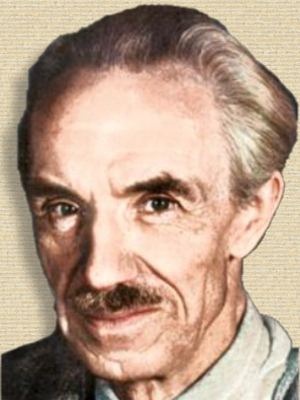
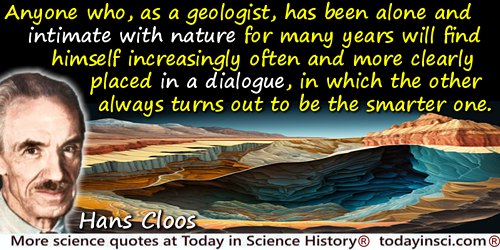

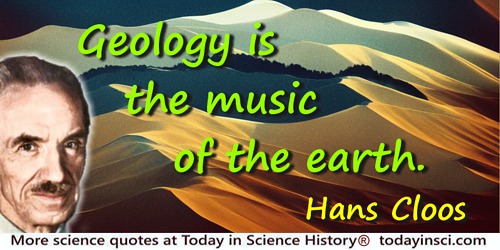
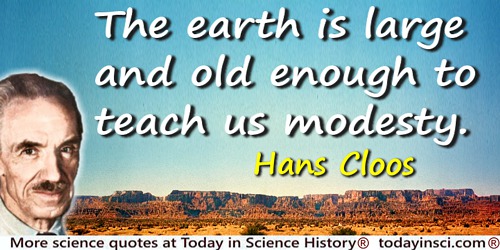

![Willem van Bemmelen quote: [In geology,] As in history, the material in hand remains silent if no questions are asked.](https://todayinsci.com/V/VanBemmelen_RW/VanBemmelenRW-Silent500x250px.jpg)
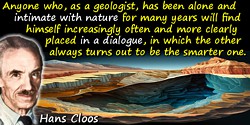
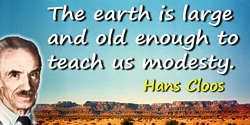
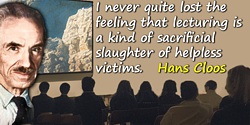
 In science it often happens that scientists say, 'You know that's a really good argument; my position is mistaken,' and then they would actually change their minds and you never hear that old view from them again. They really do it. It doesn't happen as often as it should, because scientists are human and change is sometimes painful. But it happens every day. I cannot recall the last time something like that happened in politics or religion.
(1987) --
In science it often happens that scientists say, 'You know that's a really good argument; my position is mistaken,' and then they would actually change their minds and you never hear that old view from them again. They really do it. It doesn't happen as often as it should, because scientists are human and change is sometimes painful. But it happens every day. I cannot recall the last time something like that happened in politics or religion.
(1987) -- 


